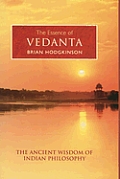![]()
Now and again a daring soul, desiring immortality, has ...

Essence of Vedanta
Brian Hodgkinson, The Essence of Vedanta
Chapter 2: Knowledge and Ignorance
Two kinds of knowledge
'What is knowledge?' asks Arjuna in the Gita. Krishna replies that it
is to know the field and the knower of the field (XIII, 1-2). What
does this strange answer mean? The field refers to everything that
can be perceived, in the widest sense of perception. In short, it is
everything that is knowable. Thus all that may be experienced through
the five senses and all that can be imagined, thought, felt or
otherwise experienced inwardly is included in the field. But then if,
as Krishna says, knowledge also means to know the knower of the
field, then that would also be amongst the knowable, so that would be
part of the field too. The solution of this dilemma is that the
knower of the field is not knowable. How then can one know something
which is not knowable? This question goes to the heart of the
philosophy of Vedanta...
The distinction that Krishna makes, however, between the field and
the knower of the field is quite different from all the distinctions
... It is not a distinction between outward empirical knowledge and
inner introspective knowledge, nor between knowledge from experience
and non-experiential, or a priori, knowledge, nor between empirical
and logical, or analytic, knowledge. All these are within the field.
If we look more precisely at Krishna's answer, we find that the
Sanskrit says something like ato know the field and the knower of the
field, that is real knowledge.' In other words, he suggests that
there are two kinds of knowledge, a higher and lower. The latter is
simply to know the field, the former is to know oneself as the knower
of the field. This is confirmed elsewhere in the Gita and throughout
Vedantic literature. As the modern Vedantist Nikhilananda wrote,
'Self-knowledge is vital. All other forms of knowledge are of
secondary importance.' They cover more or less everything that we
would call knowledge in the Western world.. Psychologists and similar
investigators of the mind, or psyche, might object on the grounds
that they study and discover knowledge of the self. But do they?
Their field of investigation—the phrase is significant—is the
contents of the mind, of the emotions and of the imagination, however
deeply they penetrate these. How can the Vedantist be sure of this?
The reason is that the self is not to be discovered by looking into
the mind, but by finding that which is itself aware of the mind, the
knower of the field.
The contrast between higher and lower knowledge is strikingly put in
the Katha Upanishad:
'God made sense turn outward, man therefore looks outward, not into
himself. Now and again a daring soul, desiring immortality, has
looked back and found himself.' (The Ten Principal Upanishads, pg. 33)
The passage does not simply refer to the five senses turning outwards
to the spatial world. The 'sense' that turns outwards includes the
sense of inner experience, thoughts and feelings and so on, for these
are 'outside' the perceiving or knowing of self. The 'daring soul' is
the man who wants real self-knowledge, who wants to know the knower
of the field.
Brian Hodgkinson, The Essence of Vedanta,
Arcturus Publishing Ltd., Canada, pg. 17-19
Articles concerning Sahaja Yoga and Shri Mataji
Related Articles:
God Realization - Not Just Sermonizing
The Mystic Vision - Daily Encounters with the Divine
Jesus was a Jewish heretic. Buddha was a Hindu heretic
The mystics offer us their personal testimonies
Nirvikalpa Samadhi and Self-Knowledge by Dr. Harsh K. Luthar
Savior: "In the light that shines with no shadow"
Trilogy of Bhoga, Roga and Yoga
Arwinder: "I think He (Shri Buddha) is big ... a bit bald.”
Arwinder, what it is to be a spirit?
Now and again a daring soul, desiring immortality, has ...
Realisation Of God Starts With Cosmic Vision
NOTE: If this page was accessed during a web search you may wish to browse www.adishakti.org/ where this topic or related issues are discussed in detail to promote global peace, religious harmony, and spiritual development of humanity:
Disclaimer: Our material may be copied, printed and distributed by referring to this site. This site also contains copyrighted material the use of which has not always been specifically authorized by the copyright owner. We are making such material available to our readers under the education and research provisions of "fair use" in an effort to advance freedom of inquiry for a better understanding of religious, spiritual and inter-faith issues. The material on this site is distributed without profit. If you wish to use copyrighted material for purposes other than "fair use" you must request permission from the copyright owner.